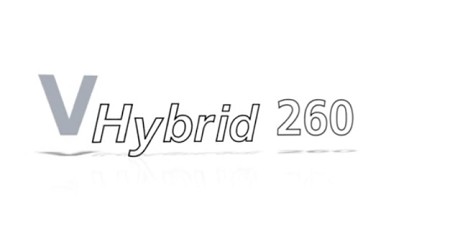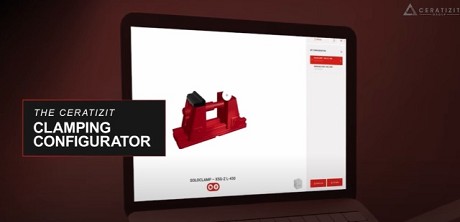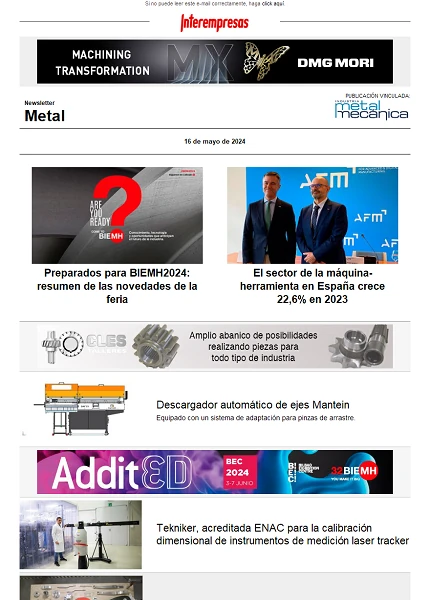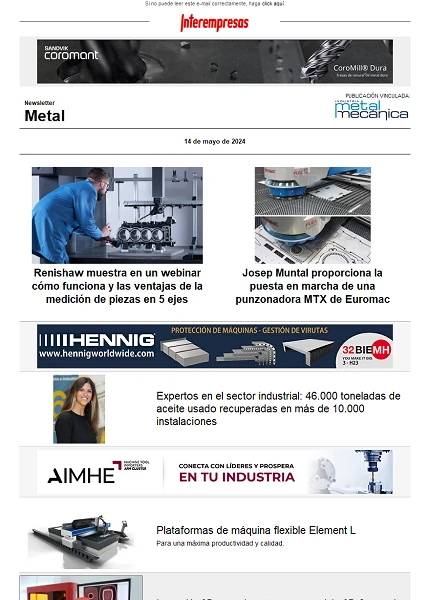Innovation, competitiveness and ideas ' banter' for the meetings in Barcelona
June 23, 2010
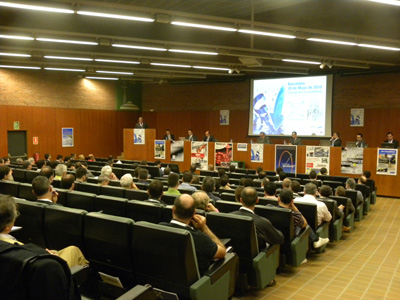
"There is no perfect people, but perfect intentions" was the phrase for the 1991 film 'Robin Hood, Prince of thieves' who headed the fourth edition of the meetings of the machining. And, what most perfect intention than the help? Help, in this case, the SMEs to become more competitive through an intense and varied presentations of different depth program. He spoke again with simplicity and closeness of the real problems of SMEs in the tooling, short and dynamic interventions and micros open for anyone who would like to make their contribution.
A sector performed but not sunk
Fourth meetings, the institutions were represented, on the one hand, by Antoni Soy, Secretary of industry and business of the Generalitat de Catalunya and, on the other hand, by Antoni Marsal, President of UPM, Unió Patronal metal·lúrgica. Both pointed to the importance of initiatives such as the meetings of the machining, in the words of Antoni Marsal, "brings together all the ingredients to any company or expert in this activity seeks to: analysis of challenges and opportunities, the promotion of competitiveness, reflection in lathe to costs and productivity or the taking of decisions that will be subjects" which among others that will be addressed during this day. "All of them are the great challenges that today has the mechanization and by extension the entire metal industry". In this regard, the Secretary of industry and company, Antoni Soy, stressed that the meeting "materialize one of the things that we believe that they should make companies cooperate between them because one of the ways to be more competitive is to cooperate"": cooperate to compete and be competitive".
Also, the President of UPM wanted to also emphasize the importance of the meetings of the machining that "put into value something traditional, strategic and very important for the industrial fabric of our country as it is mechanization." "It's a little served branch but that requires resolute action by all, and this at a particularly crucial time as the current".
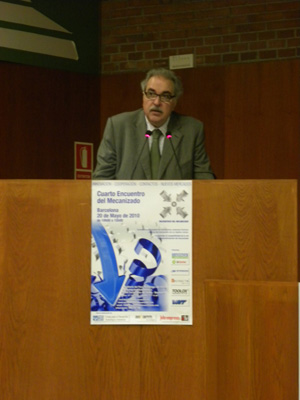
Obviously the current crisis was the sad protagonist of both parliaments. Marsal pointed out that they are two and not a crisis which have affected the metal industry: on the one hand a structural crisis for the transformation of the industry at the global level, associated with changes in technology, market and business strategies; and on the other the crisis economic, due to the general economic crisis that we are all suffering from a couple of years ago and which has more direct origin in the construction and the financial sector. The President of the employers of the metal Catalan contributed data from 2009 to summarize the effects of such crises: decrease of the production of the Catalan industry of the metal by 26.9 per cent; fall of wage employment by 14.7 per cent with the loss of almost 27,000 jobs; and use of 1,179 records of employment regulation that affected almost 82,000 workers.
Even so, indicators industrial, as noted Antoni Soy, which came to its lowest in the second quarter of 2009, will be recovering very slowly, although optimism must be relative, as noted by Antoni Marsal: "in the first quarter of 2010"the first known information point to an increase in the industrial index but a decrease in the number of salaried employment of 1.7%. These data reflect the intensity of a crisis which in addition has become certain problems everyday for businesses when it should not be so. I am referring to delinquencies, defaults or the lack of funding. "Especially important is this last item, bearing in mind that you can drag any Conatus of economic activity at the time in which manifests."
The fall in demand, derived from the climate of mistrust in the economy, we must add the lack of funding adequate from the financial institutions. According to Antoni Soy, improvement of funding depends largely the private banking and financial institutions to return to work normally, since because of the amount of toxic assets and the rise of delinquencies may not act in a normal way. In this regard, since the public Adminsitraciones "we have tried to do some things that are always insufficient". I am observed the proceedings from the Catalan ICO, the ICF - Institut Català de Finances - which "has increased form spectacular but insufficient credit to businesses and certainly some of the lines have not been as sufficiently well raised because they have not finished work". Apart, from the Administration itself such a also has been open a few lines to help the financing of the investment companies. "We have been able to do inter alia through the collaboration of business organizations, notably the UPM, which has put us in contact with many companies." I say this for those companies that are installed in Catalonia, from the Secretariat of industry and business, we have a line of credit open to investment, whose novelty is that it is guaranteed up to 70% by the Secretariat. "We are working though modestly and with constraints because the public administration at a time of crisis also has its limitations, and in spite of this we are trying to help as far as possible to alleviate the crisis facing the companies".
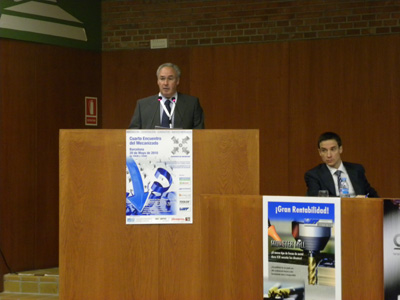
"I think we have all a lot to do - noted Marsal - and the most urgent is the following: firstly, the need to wage restraint that has our industry, so much to deal with this crisis to improve our international competitiveness." A second challenge is the labor reform. We can not resist us to introduce real structural reforms of the labour market where the number of unemployed is increasing day by day. Thirdly, should emphasise the need of injecting funding industrial companies and also for the families. It should be implement innovative mechanisms and be reformers here looking for the complicity of the financial institutions. And finally, I don't want to lose the opportunity to ask for measures to help define a new production model for Catalan industry. "Mr Antoni I am, I would like to request that continue to be a faithful ally of the industry and the metal, pushing initiatives that will respond to these demands."
For its part, the Secretary of industry and business, concluded by raising the duties to the companies of the future: "We must continue to work for the future, and work for the future means that we we must continue working to improve the productivity of enterprises is the way to increase competitiveness." And that means several things: obviously means innovation; Obviously internationalization, get out, open to the outside world, selling more abroad or making alliances, multilocalizándose in several countries; "it also means training, talent in order to be more productive". Also recognized that institutions have an important role in this future plan: "There must be clear rules by the administration." "We in Catalonia have tried them through an act of industrial policy adopted last year, and which defines the policy of the Generalitat in the industrial field in a clear manner so that companies can know what the rules of the game and also with the simplification of bureaucratic and administrative procedures".
Actions taken by UPM
UPM as employers of the metal of the province of Barcelona has focused his performance in the recent past to the difficulties they have had to deal with the companies in the sector. Antoni Marsal emphasized the actions taken by developed in 5 areas:
- Claim of the crucial role of the metal sector in society and in the Catalan economy. "I want to highlight here the Act that we held last year under the name of the Catalan Metall Crida, which was attended by a thousand entrepreneurs and that he was promoted and led by UPM".
- Collective bargaining and labour and legal advice, field in which highlights the negotiation and signing of trade in the metal until the year 2011 and the introduction of changes in the industry Convention currently in force until 2012.
- Development of institutional actions before public authorities, parties politicians, committees and parliamentary groups and financial institutions to publicize the plight of the metal and the measures which should be in place.
- Direct support that UPM has provided to the companies of the sector in several lines, as for example in the help through monitoring and consultations in line with State aid. It has also been launched the Industrial Observatory of the Metal of Catalonia together with unions and with the Secretariat of industry and enterprise of the Generalitat de Catalunya. The actions taken by UPM in the field of new business opportunities should be mentioned on the other hand. "In addition, UPM has developed actions aimed to introduce reforms in the law of late payment and is also worth mentioning initiatives of momentum to two branches so affected by the crisis as it has been the automotive and auxiliary activities of construction".
- "Finally I would like to highlight the efforts of UPM and other entities in order to promote the internationalisation of the sector and their companies." UPM along with other organizations of the metal, organized last year the Plan for the competitiveness of the sector of metal 2009, which has resulted in our case the realization of 23 initiatives in the form of business missions and visits to fairs"the creation of 6 groups of export and the launching of 2 units of supply in other countries".
Parts ' banter' for a global market
A need to address in a business meeting topic is undoubtedly the globalization of markets and the entry in the field of the so-called ' low cost' countries. Hèctor Soler, director of Tecnocim, summarized it very well in his speech to pose two extremes: low-cost countries and the countries of high cost or high added value. Weapon of competition from countries like China is mainly cheap labour, while Soler cautioned that increasingly over the Asian country will feature the centres of decision-making closer to: "the big manufacturers are being moved to low-cost countries and are preferring to have local suppliers rather than foreign suppliers". In the diametrically opposite extreme there are countries with production of high added value, they play with their high productivity and their centres of decision very closely. In addition its strength lies in its ability to form 'lobbies' powerful, with associations and trade unions with too much power, as it is the case with German. On the other hand, "we are many, little ones and we do not agree with us and we have a hard time at the same time, go with what each one looks for him and in the end cannot be make a common front and force to defend our interests." "Ultimately, we have to play in a global market and this does not require as much from us at any time."
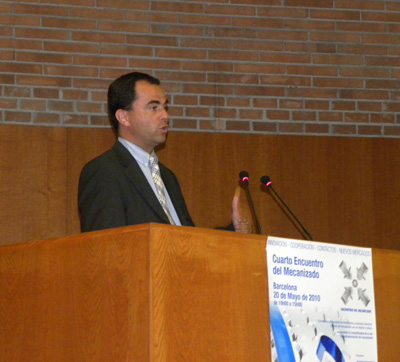
And, do you get give the maximum to be competitive? Several of the presentations in the morning gave key ideas to make a difference: centres multifunction Mazak, Tecnocim CAD/CAM, Toolox of SSAB steel solutions, synthetic lubricants from BP Castrol or automatic robotic cells proposed by the private Ascamm Foundation are key improvements that can be applied by companies to improve their productivity and I will be more competitive.
On the investment in such improvements, Roberto Hernando, director of Intermaher, exclusive distributor of Mazak, pointed out that if the employer does not procure machines such as the multi-function Mazak Integrex, considering them expensive or complex machines "is entering a very dangerous circle": not me team as I have, then no gender results, then I still I can equip as I have. "You have to try to get out of this circle and equip ourselves in a convenient way to earn money, which at the end and the place is the goal of every company." The multifunction Mazak, e.g., substantially reduce "time since that we received the order of the client unless we do the piece, her check and her charge is the minimum possible." If we do this, on the one hand our own economy of enterprise notice it, but on the other hand if we are able to give a good delivery time, we will get more orders and also in better economic conditions. "Obviously if a piece, rather than go through three machines passes through one (multi-function), our delivery time is going to improve and we will charge before." Integrated on a single computer multiple machines, as in the case of Mazak Integrex, behaves reduce inventory, unproductive time, reduces costs and staff and shorter deadlines. "We are going to avoid activities that will not provide no value to the piece and focus on activities that add value to that product." These pieces can enable us to address a market which have dealt with our neighbours in the North of Europe: Sweden, Germany, France, countries that have had to deal increasingly expensive labour costs and have sought as a solution to be able to do pieces of value, 'pieces with banter'. "These machines enable us tackle this type of market".
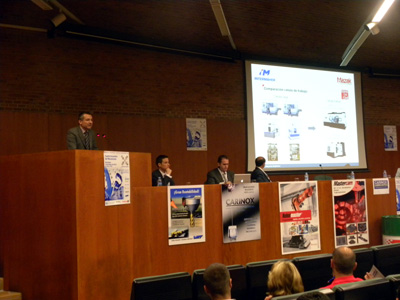
And what are the products with banter? Hernando referred several times to products with banter in their speeches, until in the Symposium, one of the attendees - Miguel Ángel Martín-(*) asked for this definition to the director of Intermaher: "I'm a bit crowded Anglo-Saxon concepts and a way to innovate is also introducing traditional concepts"", as the products with banter". Roberto Hernando defined as products with added value, but also products or processes "result of a brilliant, innovative, idea as the lollipop, which is a product with great banter." A product that somehow allows separate yourself in the market. "It may be complex or simple result itself but always behind a picture of someone that can sometimes come as an inspiration but in most cases comes from continuous reflection processes."
Particularly valuable was his statement, which warned the audience the importance of meetings such as the one held that day: "I'm not one to give advice but one that I would say to all those who are here present: see very well what has been said today"", be very careful, be very alert because for good to be an organization, you can be the current".
For its part, Tecnocim proposed integrated CAD/CAM solutions, integrating two areas of the company - technical office and workshop - which have traditionally had different tools which have been a barrier between departments, so have needed Exchange files which have led to inconsistency in the information and programming errors. "We understand the CAM as a tool of the professional, responsible for programming CNC;" We have to forget that the CAM, because it is inside the computer, will have to take with white coat. "The CAM system it has to be the person who knows the craft of mechanization," said Hector Soler, director of Tecnocim. "We understand that it must automate any repetitive task;" It is not possible that a person is doing repetitive tasks today. "Everything that is fact must automate and all CAD/CAM solution must allow this Automation".
Juan Reyes, Business Develoment of SSAB in Spain, introduced one of the possible substantial improvements which may include the machining process: the right choice of the material to be machined. "How can compete in a globalised world?" Our competition has similar to our software or tools similar to ours, used similar materials, and according to which country we are talking about, have salaries lower than ours. We must offer something different and something better. How can we improve the competitiveness of our company? "The first thing is guaranteeing the quality of our product, offer new solutions to our clients, speed up the response and differentiate our offer." In selecting material, Reyes said that often is bought to dealers of the area steel or other metals of which the origin of the manufacturer and without guarantees is unknown. "Many times give us a certificate of the own dealer which has copied these values of another vendor because you don't want us to know where it comes." We know that steel manufacturing processes? Does us different with the competition, you are buying on the site?. We provide solutions? With steels Toolox of SSAB is known to the manufacturer, which guarantees the quality, and can be conocee the process. "This Yes sets us apart from the competition." "We have full assurance that the material is not going to fail and if it fails we know where to go." SSAB guarantees the value of hardness, resistance to impact and milling. TOOLOX 44, for example, is pre-treated thermally in factory and therefore does not need to be dealt with later. "It is easy to machine, ensures its milling operations, and can be cut with business as usual as the flame cutting, sierra, etc.". This material is also dimensionally stable, a very homogenous clean steel without internal tensions. When it is Strawberry material does not move and provides excellent machining tolerances. Account with low carbon content, so it could weld and "the most important thing: very high resilience, i.e. with high impact absorption capacity, and not to produce cracks".
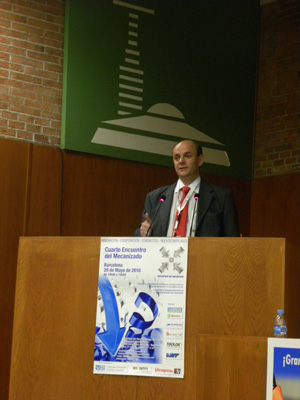
Innovate to compete
During his speech, Hèctor Soler referred to statistics of the OECD, the Organization for cooperation and economic development, which compares the increase in productivity and investment in r & d between the most industrialized countries. Spain has increased substantially its productivity during the period 2001-2007 as compared to 1995-2000, but is far behind other countries and only ahead of Denmark, Mexico and Italy "As the Czech Republic, Poland, Slovakia, Hungary countries with an increase in productivity higher than ours." "We are still very far both low-cost countries and the high value added such as Japan, Germany." With regard to the statistics of investment in r & d, "are a little better, in the part lower middle of the table but again have outstanding low-cost countries that are before us, such as China and the Czech Republic and of course high value added in front of our countries." "The truth is that these data tell us where it should go."

But not all companies have technical resources to research and development of technological innovation. For this reason there are technological centres. In this sense, Jordi Ribatallada, head of the unit equipment, automation and Mechatronics of the Private Ascamm Foundation, said: "Seize you knowledge of the technology centers." "We are open, we human feasibility and resource studies, to those companies that have no possibility of having a Department of research, and technical resources". In particular, the Department led by Ribatallada, is focused to the automation of production processes, such as process automation manual, including feasibility studies, technology watch, blueprints, integrations and turnkey projects or series. ASCAMM, as well as equipment, also provides financial support, and intellectual capital: "We hire operators on site, them are, recycle them and deliver them to the Catalan industrial fabric". Ribatallada explained the project RoboAscamm, an automatic robotic cell of industrial processes 7 in 1, a couple of cases of successful implementation in emerging sectors such as the Orthopedic or energies renewable. As commented, "the robots are not new, for 30 years there." "Only thing that now have completely innovative applications in processes".
But innovate not only is to make technical or technological developments. In his paper 'Promoting the culture of innovation in the SMEs of the machining', Candy Gordillo, responsible for commercial management of WNT Ibérica, stated that "innovation is something that everyone can integrate into our daily work." Innovate not only is technology or r & d; "we can innovate in different areas of our business, also is seeking ways to interact with our customers or suppliers or other form of address to the people". (You can read the full speech here)
Aid to the r & d
One of the most interesting morning papers was María Delgado Álvarez, of the Department of coordination and promotion of the CDTI, Centre for Industrial technological development, organization of the Ministry of science and innovation financing and supporting the projects of research and development of Spanish companies in the State and international levels. Its aim is to help increase the competitiveness of the Spanish companies, raising their technological level, with a model based on business demand and technological excellence criteria.
"If you do not have resources, not you can buy machinery or increase competitiveness." "We have funds, types of projects, we have money and want to give it". The Conference, complete with all the conditions of these help line is available on the website of the meetings of the machining.
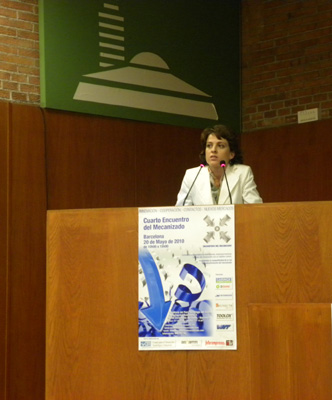
The strength of the tractors
As it is usual in the meetings of the machining, as well as the institutions, technology centres and sponsoring companies, play an important role companies tractors. As told Ramiro Bengochea, director general of WNT Ibérica and alma mater of the meetings of the machining, these companies are those who exercise a tractor effect to companies of its around smaller improve their productive and technological capabilities and that the environment is more prosperous. "Governments encourage the generation and maintenance of these companies but some of the considered tractors do not deserve this title, are not tractando in its environment, but rather seeking a short term competitiveness and getting into market in very low margins and that they just outside contracting out".
According to Bengochea many companies recognized as tractors and receiving government aid as such, "do not know what outsourcing companies have to its around, at a time that countries compete each other more than ever, are looking for your position at a time in that most coins are becoming more homogeneous." And the only way you can compete is to have a strong and competitive company and this is done with a strong network of companies to her around. "These firms must bet to know what to his about before you go outside". This comment was picked up by Ángel Hernández, responsible for the Division of Interempresas Metal and moderator of the final Symposium: "This is one of the criticisms mentioned in other previous meetings by the own machining so that are forming and equipping"", but on the other hand, companies tractor units are exclusively seeking costs without realizing other aspects". Bengochea added that under his opinion, "'m me there is lately a fashion among the large companies which seeks the hourly rate of 20 euros in machining, regardless of the number of hours or the outcome." "that you are looking for cheaper prices per hour and the more economical hourly rate". This item was already included in a post on the own Bengochea in the blog of the web site of the meetings, where bass title ' business driven, how many deserve this title ' says: "to the people who make decisions in the companies supposedly tractors"?a question: does in what invest more time lately: organize your next travel to China, India, Czech Republic, etc... or know the possibilities of SMEs of subcontracting in your environment? ", although Bengochea, blame her have the companies themselves": "Us nor do we give to know." We don't do anything so know us the local big companies, do not say the from outside. "We must disclose the capabilities of subcontracting companies".
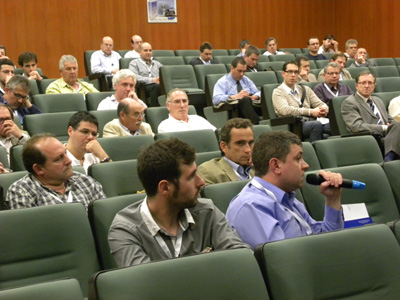
All this is that valuable collaboration in the meetings of the machining of Indra, the director of Compras-Subcontratación of which, Francisco Javier Salorio of del Moral, participated with the presentation ' Indra, global company: global approach to outsourcing '. On his speech and vision of Indra about the outsourcing in the area of machining, read the interview by the director of Compras-Subcontratación to Interempresas.
Salorio echoed many of the ideas these during the day: "Keep in mind both for us as company tractor, for clients including the entire network of subcontracting companies, the globalisation of markets is a reality that we must not forget": the improvement in productivity, added value, innovation and process improvement are factors to be more competitive. "We have to be smarter and have the opportunity to think more about what you bring between hands and to plan and have you all and to raise the level of professionalism that we must be all in order to compete in markets that are increasingly more aggressive".
The export factor
The internationalization of Spanish companies was another of the key factors highlighted by several participants as a shock to the market situation.
Since Antoni Soy stressed in his speech "seems clear that there are sectors that have more problems than others and companies that have more problems than others." "There is that companies who return to work, to demand and to consider investing have been companies that are especially export or that are related to exporting companies".
During the Symposium, two of the assistants told his experience abroad. One of them was installed in Shanghai and the other in Huston (USA). The businessman installed in China, belonging to the Inteva company, said that him for, more than the salaries, the main difference between a Chinese worker and one Spanish is the attitude and the motivation for this to work. He also regretted the little Spanish presence at international trade fairs.
On the other hand, Jorge Rodríguez, director-general of Carinox, added that companies are trying to grow outside also can grow in Spain: "we must not neglect the Spanish market, look for new opportunities and new products." "Not us we obcequemos to get out to sell and export when we can grow in the domestic market".
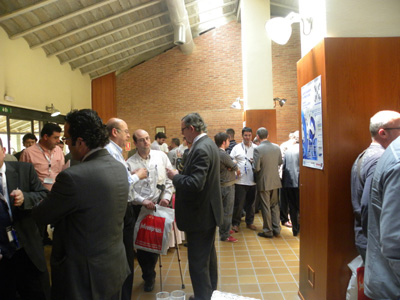
One of the papers that liked most to attendees, interesting and entertaining, was again the taught by José Antonio Gómez Vadillo, director of Group Vadillo advisers: ' the solitude of the steering of the SME before making decisions. You can read in full at this link.


